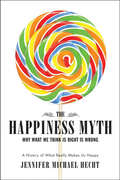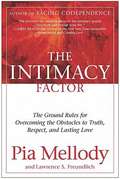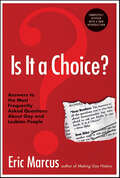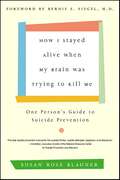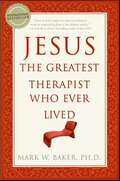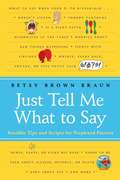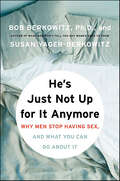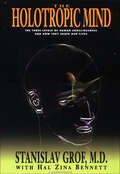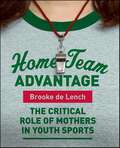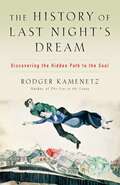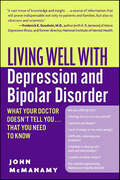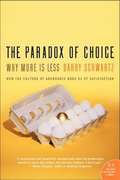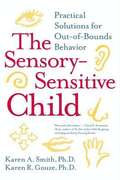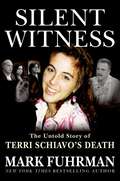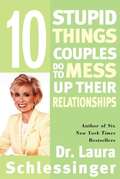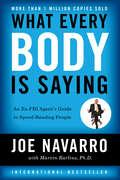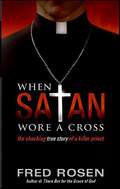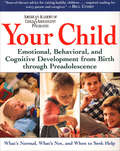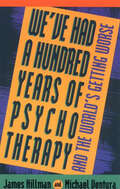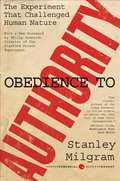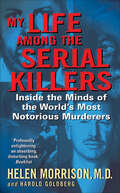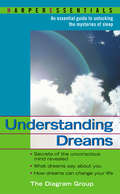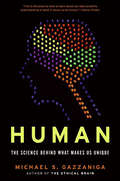- Table View
- List View
The Happiness Myth: Why What We Think Is Right Is Wrong
by Jennifer Hecht“Among the raft of happiness books published lately, this one is the obvious standout. I suggest climbing aboard.” —Cleveland Plain DealerIn this “eclectic and entertaining” book (Publishers Weekly), Jennifer Michael Hecht explodes myths both ancient and modern about how to be happy—liberating us from the message that there’s only one way to care for our hearts, minds, and bodies. The result is “a provocative, well-researched cultural history that will certainly make readers rethink their assumptions about what constitutes happiness” (Library Journal).“Hecht’s curiosity ranges widely, and the breadth of her learning is impressive . . . Fresh and daring analysis.” —The Washington Post“Deep and thoughtful.” —Scientific American“Exposing the half-baked fads of the present by illuminating the even less baked ones of the past can be a lot of fun, and Hecht, a historian and poet, entertains us with some classics.” —The New York Times“A pleasure not only to read but also to ponder.” —Booklist
The Intimacy Factor
by Lawrence S. Freundlich Pia MellodyIn her first book in over 10 years, Pia Mellody--author of the groundbreaking bestsellers Facing Codependence and Facing Love Addiction--shares her profound wisdom on what it takes to sustain true intimacy and trusting love in our most vital relationships. Drawing on more than 20 years' experience as a counsellor at the renowned Meadows Treatment Centre in Arizona, Mellody now shares what she has learned about why intimate relationships falter--and what makes them work. Using the most up-to-date research and real-life examples, including her own compelling personal journey, Mellody provides readers with profoundly insightful and practical ground rules for relationships that achieve and maintain joyous intimacy. This invaluable resource helps diagnose the causes of faulty relationships--many of them rooted in childhood--and provides tools for readers to heal themselves, enabling them to establish and maintain healthy relationships.
Is It a Choice?: Answers to Three Hundred of the Most Frequently Asked Questions About Gay and Lesbian People
by Eric MarcusThe answers to all the questions you've ever had about sexual orientation but were afraid to ask. Eric Marcus provides insightful, no-nonsense answers to hundreds of the most commonly asked questions about same-sex orientation. Offering frank and accepting insight on everything you've always wanted-and needed-to know about same-gender relationships, coming out, family roles, politics, and much more, including: How do you know if you're gay or lesbian?What should you do if your child is gay or lesbian?Do gay parents raise gay children?What does the Bible say about homosexuality?
How I Stayed Alive When My Brain Was Trying to Kill Me: One Person's Guide to Suicide Prevention
by Susan Rose BlaunerA woman shares her eighteen-year struggle with suicidal thoughts, explains the brain functions behind those thoughts, and offers tricks to overcome them.The statistics on suicide are staggering. According to the US Center for Disease Control and Prevention, in 1997 in the United States, more teenagers and young adults died from suicide than from cancer, heart disease, AIDS, birth defects, stroke, pneumonia, influenza, and chronic lung disease combined. It is also an international epidemic.Susan Blauner is the perfect emissary for a message of hope and a program of action for these millions of people. She’s been though it, and speaks and writes eloquently about feelings and fantasies surrounding suicide.“The best suicide prevention manual for the suicidal thinker, suicide attempter, layperson, or professional.” —Iris Bolton, founder of the National Resource Center for Suicide Prevention and Aftercare“How I Stayed Alive is like a Fodor’s guide that gets you from the depths of hell of depression to the paradise of a balanced life.” —Reese Butler, executive director and founder of the National Hopeline Network“With neither hollow platitudes nor medical doublespeak . . . an extreme valuable and much needed tool for suicidal thinkers and their loved ones.” —Publishers Weekly
Jesus, the Greatest Therapist Who Ever Lived
by Mark W. BakerThe healer of body, soul—and mind: “Gives us fresh insight into deep psychological truths by emphasizing Jesus as the ultimate teacher.” —Laurie Beth Jones, author of Jesus, CEOOver one hundred years of modern psychology and we still haven’t improved on the principles and lessons taught by the greatest doctor of the human soul—Jesus. In this accessible and eye-opening book, international bestselling author Dr. Mark Baker offers a refreshing and practical understanding of how the teachings of Jesus are not only compatible with the science of psychology, but still speak to our problems and struggles today. Filled with biblical quotations and real-life stories and divided into two major sections, “Understanding People” and “Knowing Yourself,” this easy-to-use guide reveals how the gospel continues to have the power to lighten the darkest corners of the human spirit.
Just Tell Me What to Say
by Betsy Brown BraunParents are often perplexed by their children's typical behaviors and inevitable questions. This down-to-earth guide provides "Tips and Scripts" for handling everything from sibling rivalry and the food wars to questions about death, divorce, sex, and "whyyyy?" Betsy Brown Braun blends humor with her expertise as a child development specialist, popular parent educator, and mother of triplets. Whatever your dilemma or child's question--from "How did the baby get in your tummy?" to "What does 'dead' mean?" to "It's not fair!"--Betsy offers the tools and confidence you need to explain the world to your growing child.
He's Just Not Up for It Anymore: Why Men Stop Having Sex, and What You Can Do About It
by Susan Yager-Berkowitz Bob BerkowitzAn estimated twenty million American men and women are in relationships in which the man has stopped being sexually intimate. Is the problem physical, emotional, or psychological—or are these guys simply bored with their partners?To find answers, bestselling author and relationship expert Dr. Bob Berkowitz and his wife, Susan Yager-Berkowitz, began an unprecedented survey of more than four thousand men and women in this situation, gathering data and following up with hundreds of interviews with selected respondents. Why Men Stop Having Sex provides a unique window into the sexless man's mind—so that men and women can understand this important issue and begin to address the problems that have inhibited intimacy, and ultimately solve them.
The Holotropic Mind: The Three Levels of Human Consciousness and How They Shape Our Lives
by Hal Zina Bennett Stanislav Grof“An exceptionally clear and readable introduction to the evolving psychology of the spirit, transpersonal psychology” from the renowned psychiatrist (Charles T. Tart, PhD, author of Mind Science).A turning point in psychology and human history . . . Loaded with case studies which present a unified model of human consciousness—a revolutionary map of the mind that explains our evolution, behavior, personality, and the mind-body connection—this work takes readers on a compelling journey into the mind, human behavior, and future of humankind.“If you want to know about the psychology of the future today, read this book. It is about a revolution in our understanding of the mind that is as far-reaching in psychology as the idea of the quantum was to physics.” —Fred Alan Wolf, PhD, author of Taking the Quantum Leap“Grof marshals an impressive array of data and speculation in support of the timely demand that Western science acknowledge consciousness and its many non-ordinary states.” —Ram Dass
Home Team Advantage: The Critical Role of Mothers in Youth Sports
by Brooke de LenchOver the past decade, the stakes in youth sports have reached startling heights; the pressure to win often eclipses the desire to have fun. Sports injuries have increased tenfold; aggression on and off the field—between kids, parents, and coaches—is at a fever pitch; and drug and alcohol use among young athletes is on the rise. While there are plenty of books that help the best-intentioned parent, most of them are written by men, for men. They do not address concerns specific to mothers, nor empower them to confidently step onto the out-of-control playground to assume whatever role they choose—spectator, advocate, administrator, coach, fund-raiser, or team mom.Home Team Advantage is an essential resource manual that will inspire women to confidently tackle some of the issues preventing their kids from enjoying sports. Brooke de Lench authoritatively covers issues ranging from ensuring playing time and confronting out-of-control coaches to countering the "winning at all costs" mentality. Packed with real-life anecdotes and information from experts, Home Team Advantage provides constructive, practical, and forward-thinking advice to help mothers understand the critical role they can play in putting the words fun, game, and play back into youth sports.
The History of Last Night's Dream: Discovering the Hidden Path to the Soul
by Rodger KamenetzOur Dreams Will Never Be the Same AgainInternational bestselling author Rodger Kamenetz believes it is not too late to reclaim the lost power of our nightly visions. He fearlessly delves into this mysterious inner realm and shows us that dreams are not only intensely meaningful, but hold essential truths about who we are. In the end, each of us has the choice to embark on this illuminating path to the soul.
Living Well with Depression and Bipolar Disorder: What Your Doctor Doesn't Tell You . . . That You Need to Know
by John McManamySeven years ago, John McManamy was diagnosed with bipolar disorder. Through his successful Web site and newsletter, he has turned his struggles into a lifelong dedication to helping others battling depression and bipolar disorder reclaim their lives. In Living Well with Depression and Bipolar Disorder, he brilliantly blends the knowledge of leading expert authorities with the experiences of his fellow patients, as well as his own, and offers extensive information on:Diagnosing the problemAssociated illnesses and symptomsTreatments, lifestyle, and copingThe effects of depression and bipolar disorder on relationships and sexWith a compassionate and eloquent voice, McManamy describes his belief that depression is a wide spectrum that reaches from occasional bouts of depression to full-fledged bipolar disorder. The first book to help patients recognize this diversity of the disorder, Living Well with Depression and Bipolar Disorder will help sufferers begin to reclaim their lives.
The Paradox of Choice
by Barry SchwartzIn the spirit of Alvin Toffler's Future Shock, a social critique of our obsession with choice, and how it contributes to anxiety, dissatisfaction and regret. This paperback includes a new P.S. section with author interviews, insights, features, suggested readings, and more. Whether we're buying a pair of jeans, ordering a cup of coffee, selecting a long-distance carrier, applying to college, choosing a doctor, or setting up a 401(k), everyday decisions--both big and small--have become increasingly complex due to the overwhelming abundance of choice with which we are presented.We assume that more choice means better options and greater satisfaction. But beware of excessive choice: choice overload can make you question the decisions you make before you even make them, it can set you up for unrealistically high expectations, and it can make you blame yourself for any and all failures. In the long run, this can lead to decision-making paralysis, anxiety, and perpetual stress. And, in a culture that tells us that there is no excuse for falling short of perfection when your options are limitless, too much choice can lead to clinical depression.In The Paradox of Choice, Barry Schwartz explains at what point choice--the hallmark of individual freedom and self-determination that we so cherish--becomes detrimental to our psychological and emotional well-being. In accessible, engaging, and anecdotal prose, Schwartz shows how the dramatic explosion in choice--from the mundane to the profound challenges of balancing career, family, and individual needs--has paradoxically become a problem instead of a solution. Schwartz also shows how our obsession with choice encourages us to seek that which makes us feel worse.By synthesizing current research in the social sciences, Schwartz makes the counterintuitive case that eliminating choices can greatly reduce the stress, anxiety, and busyness of our lives. He offers eleven practical steps on how to limit choices to a manageable number, have the discipline to focus on the important ones and ignore the rest, and ultimately derive greater satisfaction from the choices you have to make.
The Paradox of Choice
by Barry SchwartzIn the spirit of Alvin Toffler's Future Shock, a social critique of our obsession with choice, and how it contributes to anxiety, dissatisfaction and regret. This paperback includes a new P.S. section with author interviews, insights, features, suggested readings, and more.Whether we're buying a pair of jeans, ordering a cup of coffee, selecting a long-distance carrier, applying to college, choosing a doctor, or setting up a 401(k), everyday decisions--both big and small--have become increasingly complex due to the overwhelming abundance of choice with which we are presented.We assume that more choice means better options and greater satisfaction. But beware of excessive choice: choice overload can make you question the decisions you make before you even make them, it can set you up for unrealistically high expectations, and it can make you blame yourself for any and all failures. In the long run, this can lead to decision-making paralysis, anxiety, and perpetual stress. And, in a culture that tells us that there is no excuse for falling short of perfection when your options are limitless, too much choice can lead to clinical depression.In The Paradox of Choice, Barry Schwartz explains at what point choice--the hallmark of individual freedom and self-determination that we so cherish--becomes detrimental to our psychological and emotional well-being. In accessible, engaging, and anecdotal prose, Schwartz shows how the dramatic explosion in choice--from the mundane to the profound challenges of balancing career, family, and individual needs--has paradoxically become a problem instead of a solution. Schwartz also shows how our obsession with choice encourages us to seek that which makes us feel worse.By synthesizing current research in the social sciences, Schwartz makes the counterintuitive case that eliminating choices can greatly reduce the stress, anxiety, and busyness of our lives. He offers eleven practical steps on how to limit choices to a manageable number, have the discipline to focus on the important ones and ignore the rest, and ultimately derive greater satisfaction from the choices you have to make.
The Sensory-Sensitive Child
by Karen R. Gouze Karen A. SmithIn a book likely to transform how parents manage many of their child's daily struggles, Drs. Smith and Gouze explain the central and frequently unrecognized role that sensory processing problems play in a child's emotional and behavioral difficulties. Practicing child psychologists, and themselves parents of children with sensory integration problems, their message is innovative, practical, and, above all, full of hope. A child with sensory processing problems overreacts or underreacts to sensory experiences most of us take in stride. A busy classroom, new clothes, food smells, sports activities, even hugs can send such a child spinning out of control. The result can be heartbreaking: battles over dressing, bathing, schoolwork, social functions, holidays, and countless other events. In addition, the authors say, many childhood psychiatric disorders may have an unidentified sensory component. Readers Will Learn: The latest scientific knowledge about sensory integration How to recognize sensory processing problems in children and evaluate the options for treatment How to prevent conflicts by viewing the child's world through a "sensory lens" Strategies for handling sensory integration challenges at home, at school, and in twenty-first century kid culture The result: a happier childhood, a more harmonious family, and a more cooperative classroom. This thoroughly researched, useful, and compassionate guide will help families start on a new path of empowerment and success.
Silent Witness: The Untold Story of Terri Schiavo's Death
by Mark FuhrmanWe all watched Terri Schiavo die. The controversy around her case dominated the headlines and talk shows, going all the way to the U.S. Supreme Court, the White House, and the Vatican.And it's not over yet. Despite her death, the controversy lingers. In Silent Witness, former LAPD detective and New York Times bestselling author Mark Fuhrman applies his highly respected investigative skills to examine the medical evidence, legal case files, and police records. With the complete cooperation of Terri Schiavo's parents and siblings, as well as their medical and legal advisers, he conducts exclusive interviews with forensics experts and crucial witnesses, including friends, family members, and caregivers.Fuhrman's findings will answer these questions:What was Terri and Michael Schiavo's marriage really like?What happened the day Terri collapsed?What did Michael Schiavo do when he discovered Terri unconscious? How long did he wait before calling 911?What do medical records show about her condition when she was first admitted to the hospital?What will the autopsy say?The legal issues and ethical questions provoked by Terri Schiavo's extraordinary case may never be resolved. But the facts about her marriage, her condition when she collapsed, and her eventual death fifteen years later can be determined.With Silent Witness, Fuhrman goes beyond the legal aspects of the case and delves into the broader, human background of Terri Schiavo's short, sad life.
The Spiritual Brain: A Neuroscientist's Case for the Existence of the Soul
by Denyse O'Leary Mario BeauregardDo religious experiences come from God, or are they merely the random firing of neurons in the brain? Drawing on his own research with Carmelite nuns, neuroscientist Mario Beauregard shows that genuine, life-changing spiritual events can be documented. He offers compelling evidence that religious experiences have a nonmaterial origin, making a convincing case for what many in scientific fields are loath to consider—that it is God who creates our spiritual experiences, not the brain. Beauregard and O'Leary explore recent attempts to locate a "God gene" in some of us and claims that our brains are "hardwired" for religion—even the strange case of one neuroscientist who allegedly invented an electromagnetic "God helmet" that could produce a mystical experience in anyone who wore it. The authors argue that these attempts are misguided and narrow-minded, because they reduce spiritual experiences to material phenomena. Many scientists ignore hard evidence that challenges their materialistic prejudice, clinging to the limited view that our experiences are explainable only by material causes, in the obstinate conviction that the physical world is the only reality. But scientific materialism is at a loss to explain irrefutable accounts of mind over matter, of intuition, willpower, and leaps of faith, of the "placebo effect" in medicine, of near-death experiences on the operating table, and of psychic premonitions of a loved one in crisis, to say nothing of the occasional sense of oneness with nature and mystical experiences in meditation or prayer. Traditional science explains away these and other occurrences as delusions or misunderstandings, but by exploring the latest neurological research on phenomena such as these, The Spiritual Brain gets to their real source.
Ten Stupid Things Couples Do to Mess Up Their Relationships
by Laura Schlessinger1. Stupid Secrets Withholding important information for fear of rejection 2. Stupid Egotism Asking not what you can do for the relationship but only what the relationship can do for you 3. Stupid Pettiness Making a big deal out of the small stuff 4. Stupid Power Always trying to be in control 5. Stupid Priorities Consuming all your time and energies with work, hobbies, errands, and chores instead of focusing on your relationship 6. Stupid Happiness Seeking stimulation and assurance from all the wrong places to satisfy the immature need to feel good 7. Stupid Excuses Not being accountable for bad behavior 8. Stupid Liaisons Not letting go of negative attachments to friends and relatives who are damaging to your relationship 9. Stupid Mismatch Not knowing when to leave and cut your losses 10. Stupid Breakups Disconnection for all the wrong reasons
What Every BODY is Saying: An Ex-FBI Agent's Guide to Speed-Reading People
by Marvin Karlins Joe NavarroHe says that's his best offer. Is it? She says she agrees. Does she? The interview went great-or did it? He said he'd never do it again. But he did. Read this book and send your nonverbal intelligence soaring. Joe Navarro, a former FBI counterintelligence officer and a recognized expert on nonverbal behavior, explains how to "speed-read" people: decode sentiments and behaviors, avoid hidden pitfalls, and look for deceptive behaviors. You'll also learn how your body language can influence what your boss, family, friends, and strangers think of you. You will discover: The ancient survival instincts that drive body language Why the face is the least likely place to gauge a person's true feelings What thumbs, feet, and eyelids reveal about moods and motives The most powerful behaviors that reveal our confidence and true sentiments Simple nonverbals that instantly establish trust Simple nonverbals that instantly communicate authority Filled with examples from Navarro's professional experience, this definitive book offers a powerful new way to navigate your world.
When Satan Wore A Cross: The Shocking True Story of a Killer Priest
by Fred RosenIn 1980 in Toledo, Ohio—on one of the holiest days of the church calendar—the body of a nun was discovered in the sacristy of a hospital chapel. Seventy-one-year-old Sister Margaret Ann had been strangled and stabbed, her corpse arranged in a shameful and stomach-churning pose. But the police's most likely suspect was inexplicably released and the investigation was quietly buried. Despite damning evidence, Father Gerald Robinson went free.Twenty-three years later the priest's name resurfaced in connection with a bizarre case of satanic ritual and abuse. It prompted investigators to exhume the remains of the slain nun in search of the proof left behind that would indelibly mark Father Robinson as Sister Margaret Ann's killer: the sign of the Devil.When Satan Wore a Cross is a shocking true story of official cover-ups, madness, murder and lies—and of an unholy human monster who disguised himself in holy garb.
Your Child: Emotional, Behavioral, and Cognitive Development From Birth to Adolescence
by David PruittWhat does a typical three-year-old think about and feel? What can you anticipate from your five-year-old about to begin school? What does it mean that your eight-year-old seems to lie regularly?Your Child takes you step-by-step through the developmental milestones of childhood, discussing specific questions and concerns and examining more troublesome problems. From choosing your baby's doctor to dealing with steep problems, from helping a child develop selfesteem to discerning when certain behaviors call for professional help -- and how to find it -- this book offers comprehensive and accessible information for parents on the emotional, behavioral, and cognitive development of children from infancy through the preadolescent years. Expertly and definitively offering practical advice and invaluable information, Your Child will guide you through every stage of your child's growth and help you meet the daily challenges of parenting.
We've Had a Hundred Years of Psychotherapy: And the World's Getting Worse
by James Hillman Michael VenturaThe #1 New York Times–bestselling author of The Soul’s Code engages in a wide-ranging dialogue that “bursts with vigorous ideas, tangents, and humor” (Library Journal).This furious, trenchant, and audacious series of interrelated dialogues and letters takes a searing look at not only the legacy of psychotherapy, but also practically every aspect of contemporary living—from sexuality to politics, media, the environment, and life in the city. James Hillman—controversial renegade Jungian psychologist and the man Robert Bly called “the most lively and original psychologist we’ve had in America since William James”—joins with Michael Ventura, cutting-edge columnist for the L.A. Weekly, to shatter many of our current beliefs about our lives, the psyche, and society. Unrestrained, freewheeling, and brilliant, these two intellectual wild men take chances, break rules, and run red lights to strike at the very core of our shibboleths and perceptions.“All sorts of fresh ideas.” —Los Angeles Times“Thought-provoking, fun, and not quite like anything else.” —Library Journal“Range[s] energetically over such subjects as psychotherapy, politics and aesthetics, method acting and postwar ideas of the self, child abuse and inner child theory, romantic love, and America’s tradition of anti-intellectualism . . . Seductive precisely because if offers two live voices actively engaged.” —The Washington Post
Obedience to Authority: An Experimental View
by Stanley MilgramThis book presents Milgram's fascinating and troubling chronicle of his classic study and a vivid and persuasive explanation of his conclusions.
My Life Among the Serial Killers: Inside the Minds of the World's Most Notorious Murderers
by Helen Morrison Harold GoldbergIn this memoir, a forensic psychiatrist chronicles her work with more than 80 serial killers and her thoughts on what compels them.Judging by appearances, Dr. Helen Morrison has an ordinary life in the suburbs of a major city. She has a physician husband, two children, and a thriving psychiatric clinic. But her life is more than that. She is one of the world’s leading experts on serial killers, and has spent as many as four hundred hours alone in rooms with depraved murderers, digging deep into killers’ psyches in ways no profiler ever has before.In My Life among the Serial Killers, Dr. Morrison relates how she profiled the Mad Biter, Richard Otto Macek, who chewed on his victims’ body parts, stalked Dr. Morrison, then believed she was his wife. She did the last interview with Ed Gein, who was the inspiration for Alfred Hitchcock's Psycho. John Wayne Gacy, the clown-obsessed killer of young men, sent her crazed Christmas cards and gave her his paintings as presents. Then there was Atlanta child killer Wayne Williams; rapist turned murderer Bobby Joe Long; Fred and Rosemary West, who killed girls and women in their Gloucester “House of Horrors”; and Brazil’s deadliest killer of children, Marcelo Costa de Andrade.Dr. Morrison has received hundreds of letters from killers, read their diaries and journals, evaluated crime scenes, testified at their trials, and studied photos of the gruesome carnage. She has interviewed the families of the victims—and the spouses and parents of the killers—to gain a deeper understanding of the killer’s environment and the public persona they adopt. She has also studied serial killers throughout history and shows how this is not a recent phenomenon with psychological autopsies of the fifteenth-century French war hero Gilles de Rais, the sixteenth-century Hungarian Countess Bathory, H.H. Holmes of the late nineteenth-century, and Albert Fish of the Roaring Twenties.Through it all, Dr. Morrison’s goal has been to discover the reasons serial killers are compelled to murder, how they choose their victims, and what we can do to prevent their crimes in the future. Her provocative conclusions will stun you.Praise for My Life Among the Serial Killers“A scary piece of work, with even scarier implications.” —Kirkus Reviews“A profoundly enlightening book. Morrison provides startling insights into what factors breed serial killers, and she avoids the broad generalizations that make other books of the topic seem slick and superficial. . . . This is an absorbing, disturbing book that makes it clear just how much we have yet to learn.” —Booklist
Understanding Dreams
by The Diagram GroupIt has been said that dreams are the windows to the soul -- andnow those windows can be opened wide! The book you hold in your hands is a concise compendium of prescriptive information, an easy-to-use reference guide to the meanings and import of the remarkable visions that visit us while we sleep.Here in one volume are the essential keys to unlocking themysteries of the subconscious -- and to putting the power of dreams at your fingertips! The meaning behind more than 800 dream symbols The history of dream interpretation Lucid, repetitive, and sequential dreams Sleep patterns and the workings of the unconscious mind How to keep a "dream diary"
Human: The Science Behind What Makes Your Brain Unique
by Michael S. Gazzaniga“[A] shimmering new book . . . This is the place to look to learn about our best scientific understanding of what it means to be human.” —Steven Pinker, New York Times bestselling author of The Language Instinct and How the Mind Works“A cognitive neuroscientist at the University of California, Santa Barbara (and one of the inventors of the field), takes us on a lively tour through the latest research on brain evolution.” —The New York Times Book ReviewWhat happened along the evolutionary trail that made humans so unique? In his accessible style, Michael Gazzaniga pinpoints the change that made us thinking, sentient humans different from our predecessors. He explores what makes human brains special, the importance of language and art in defining the human condition, the nature of human consciousness, and even artificial intelligence.“As wide-ranging as it is deep, and as entertaining as it is informative . . . will please a diverse array of readers.” —Publishers Weekly, starred review “A rich testimony to the incredible accomplishments of the human brain in coming to understand itself.” —New York Sun“Truly engaging.” —CNBC.com“A savvy, witty guide to neuroscience today.” —Kirkus Reviews“Brilliantly written and utterly fascinating.” —Robert Bazell, Chief Science Correspondent, NBC News“Sweeping, erudite and humorous . . . If you are looking for one book that gives you a Cook’s Tour of the human brain, where it came from and where it is heading, this would be an excellent choice.” —Pittsburgh Post-Gazette
